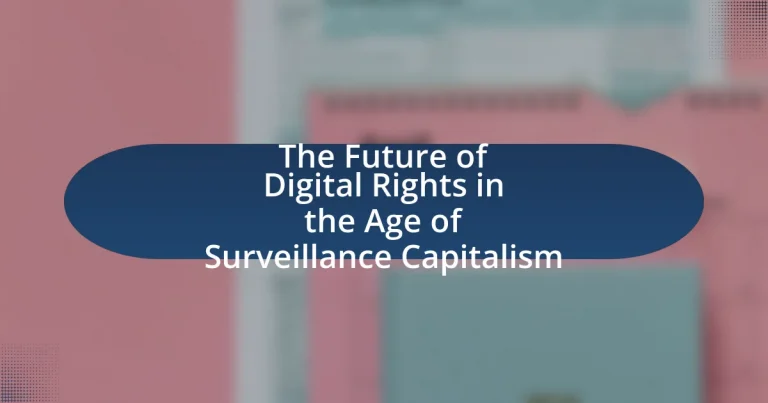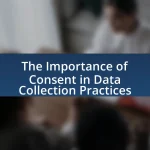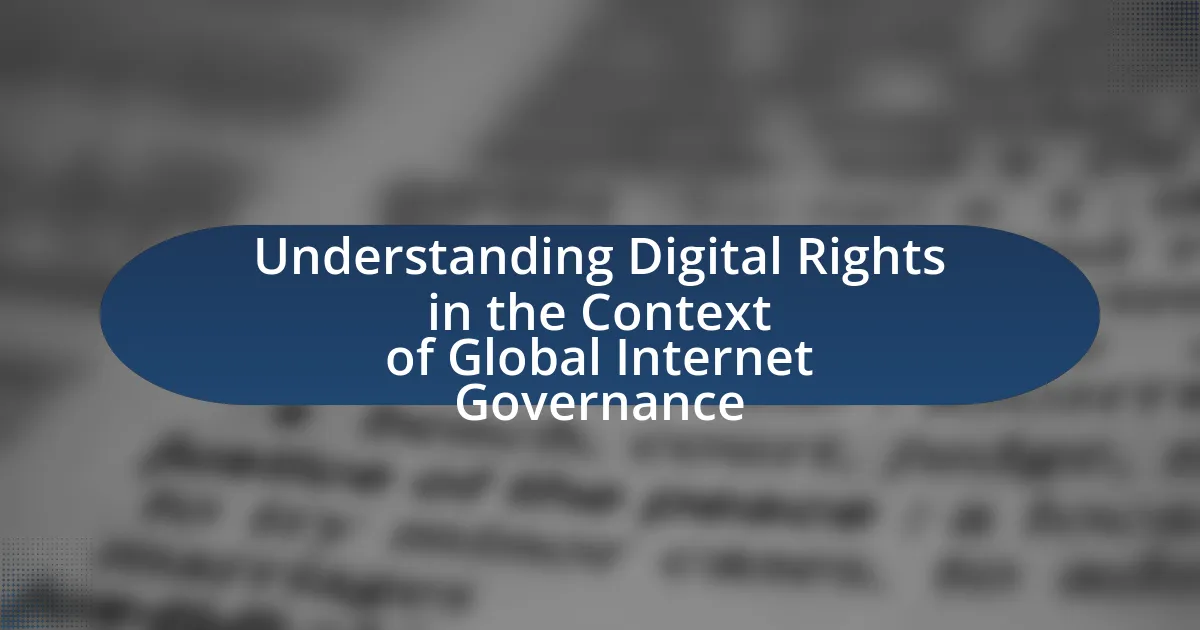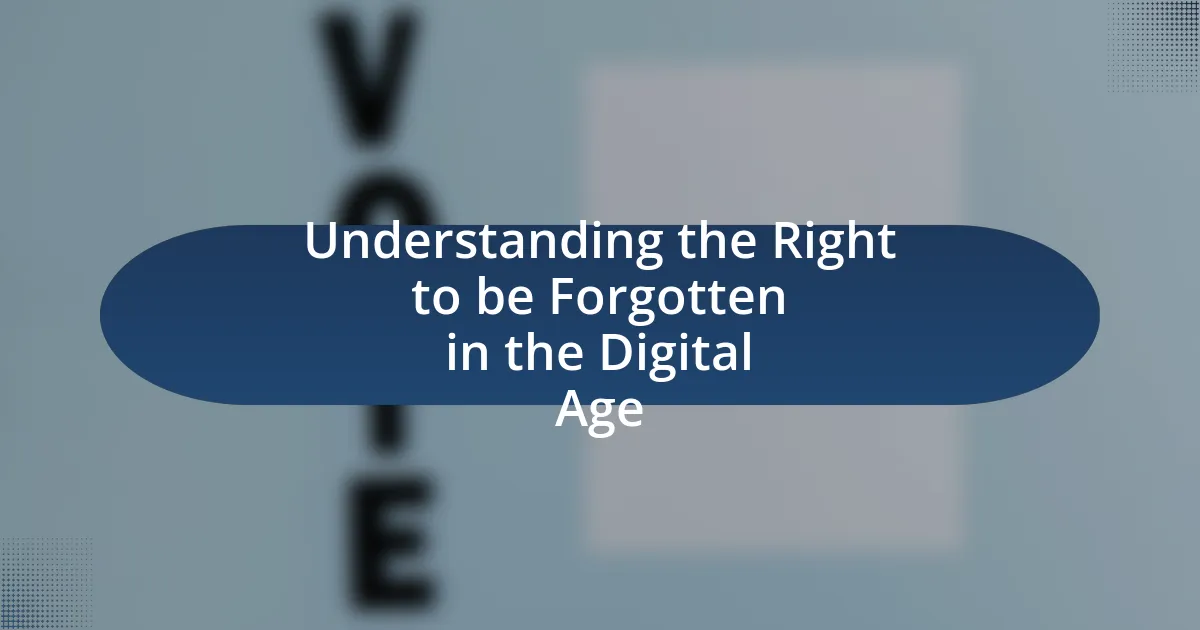The article examines the future of digital rights in the context of surveillance capitalism, highlighting the entitlements individuals have regarding their personal data and privacy amidst pervasive data collection practices by corporations. It discusses the intersection of digital rights and privacy concerns, essential rights in the digital age, and the impact of surveillance capitalism on individual freedoms. The article also addresses current challenges to digital rights, the evolving role of technology, and the importance of legal frameworks like the General Data Protection Regulation (GDPR) in protecting these rights. Additionally, it explores the role of organizations and governments in shaping digital rights and proposes initiatives for safeguarding them in an increasingly surveilled society.
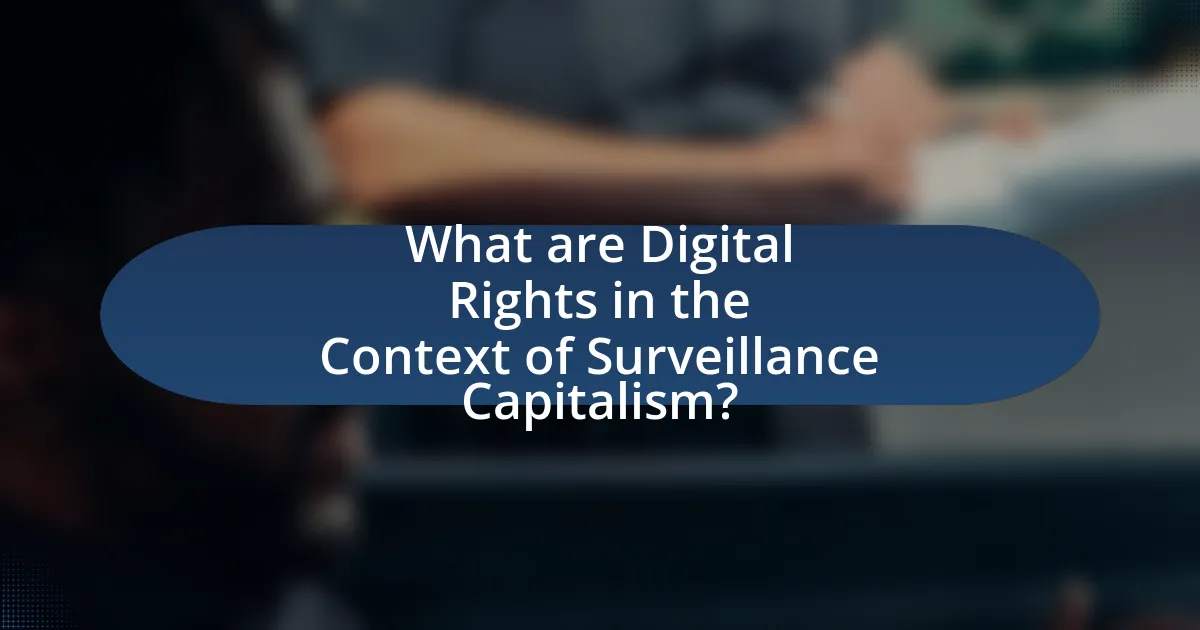
What are Digital Rights in the Context of Surveillance Capitalism?
Digital rights in the context of surveillance capitalism refer to the entitlements individuals have regarding their personal data and privacy in an environment where companies exploit user information for profit. These rights encompass the ability to control, access, and protect personal data from unauthorized surveillance and exploitation by corporations. For instance, the General Data Protection Regulation (GDPR) in the European Union establishes legal frameworks that empower individuals to manage their data, highlighting the growing recognition of digital rights amid pervasive data collection practices.
How do digital rights intersect with privacy concerns?
Digital rights and privacy concerns are closely intertwined, as both address the protection of individuals’ personal information in the digital realm. Digital rights encompass the entitlements individuals have regarding their online presence, including the right to access, control, and share their data. Privacy concerns arise when these rights are threatened by surveillance practices, data collection, and misuse of personal information by corporations and governments. For instance, the General Data Protection Regulation (GDPR) in the European Union establishes legal frameworks that protect individuals’ privacy and reinforce their digital rights by granting them control over their data. This intersection highlights the necessity for robust legal protections to ensure that digital rights are upheld while addressing privacy concerns in an increasingly surveilled society.
What specific rights are considered essential in the digital age?
Essential rights in the digital age include the right to privacy, the right to data protection, the right to freedom of expression, and the right to access information. The right to privacy ensures individuals can control their personal data and how it is used, which is increasingly vital as surveillance technologies proliferate. The right to data protection mandates that organizations handle personal information responsibly, safeguarding it against misuse. Freedom of expression allows individuals to communicate and share ideas without censorship, while the right to access information empowers users to seek and receive information freely, fostering transparency and accountability. These rights are supported by various international frameworks, such as the General Data Protection Regulation (GDPR) in Europe, which emphasizes the importance of protecting individuals’ data rights in the digital landscape.
How do these rights protect individuals from surveillance?
These rights protect individuals from surveillance by establishing legal frameworks that limit the collection, use, and dissemination of personal data. For instance, privacy rights enshrined in laws such as the General Data Protection Regulation (GDPR) in the European Union grant individuals control over their personal information, requiring explicit consent for data processing. This regulation has been shown to reduce unauthorized surveillance practices by imposing heavy fines on organizations that fail to comply, thereby incentivizing adherence to privacy standards. Additionally, rights to free expression and association safeguard individuals from being monitored for their beliefs or affiliations, fostering an environment where people can communicate and organize without fear of retribution.
Why is the concept of surveillance capitalism important for digital rights?
The concept of surveillance capitalism is important for digital rights because it fundamentally alters the relationship between individuals and their personal data. Surveillance capitalism refers to the commodification of personal data by corporations, which often leads to the erosion of privacy and autonomy. This shift poses significant threats to digital rights, as it enables companies to manipulate user behavior and undermine informed consent. For instance, research by Shoshana Zuboff in “The Age of Surveillance Capitalism” highlights how data-driven business models exploit personal information without adequate transparency or accountability, thereby infringing on individuals’ rights to privacy and control over their own data.
What are the key characteristics of surveillance capitalism?
Surveillance capitalism is characterized by the commodification of personal data, where companies collect, analyze, and utilize user information to predict and influence behavior. This phenomenon relies on extensive data collection through digital interactions, often without explicit consent, leading to a lack of transparency. Additionally, surveillance capitalism creates power imbalances, as corporations gain significant control over individuals’ choices and privacy. The economic model prioritizes profit over ethical considerations, often resulting in manipulation and exploitation of users. These characteristics are evident in practices employed by major tech companies, which have been documented in studies such as Shoshana Zuboff’s “The Age of Surveillance Capitalism,” highlighting the pervasive nature of data extraction and its implications for society.
How does surveillance capitalism impact individual freedoms?
Surveillance capitalism significantly undermines individual freedoms by enabling pervasive monitoring and data collection that restricts personal autonomy. This economic model, primarily driven by tech companies, commodifies personal information, leading to a loss of privacy and control over one’s own data. For instance, a study by Shoshana Zuboff in “The Age of Surveillance Capitalism” highlights how individuals are often unaware of the extent to which their behaviors and preferences are tracked and analyzed, resulting in manipulated choices and diminished agency. Furthermore, the Cambridge Analytica scandal exemplifies how personal data can be exploited to influence political outcomes, thereby threatening democratic processes and individual rights.
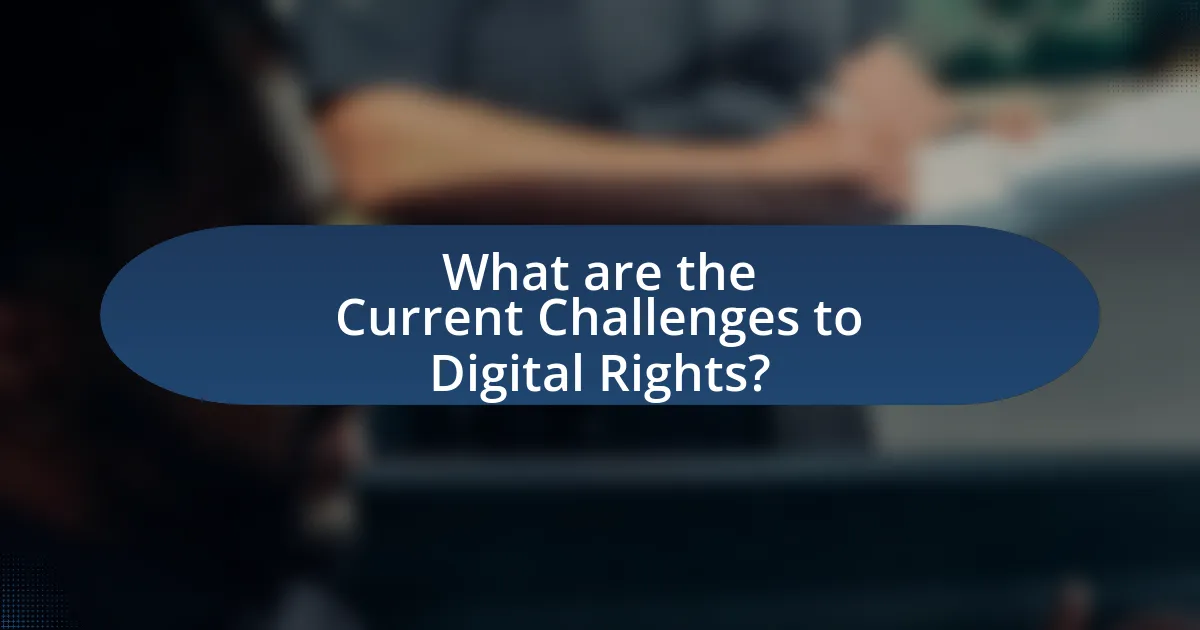
What are the Current Challenges to Digital Rights?
Current challenges to digital rights include pervasive surveillance, data privacy violations, and the monopolization of digital platforms. Surveillance capitalism, as defined by Shoshana Zuboff, undermines individual autonomy by exploiting personal data for profit without informed consent. Additionally, the lack of robust regulations allows companies to collect and misuse data, leading to breaches of privacy. According to a 2021 report by the Electronic Frontier Foundation, 79% of Americans express concern over their online privacy, highlighting the widespread apprehension regarding data security. Furthermore, the dominance of a few tech giants restricts competition and stifles innovation, creating an environment where user rights are often overlooked.
How is technology evolving to challenge digital rights?
Technology is evolving to challenge digital rights primarily through advancements in surveillance capabilities and data collection methods. The proliferation of artificial intelligence and machine learning enables more sophisticated tracking and profiling of individuals, often without their consent. For instance, the use of facial recognition technology by law enforcement agencies has raised significant concerns regarding privacy violations and the potential for misuse. According to a report by the Electronic Frontier Foundation, over 70% of U.S. cities have adopted some form of facial recognition technology, which can lead to wrongful arrests and discrimination. Additionally, the rise of the Internet of Things (IoT) devices increases the amount of personal data collected, often with inadequate security measures, further jeopardizing individual privacy rights. These technological trends illustrate a growing tension between innovation and the protection of digital rights in an increasingly surveilled society.
What role do algorithms play in surveillance practices?
Algorithms play a crucial role in surveillance practices by enabling the automated collection, analysis, and interpretation of vast amounts of data. These algorithms process information from various sources, such as social media, public records, and sensor data, to identify patterns, predict behaviors, and monitor individuals or groups. For instance, facial recognition algorithms can analyze images in real-time to identify individuals in public spaces, significantly enhancing surveillance capabilities. According to a report by the Electronic Frontier Foundation, the use of algorithms in surveillance has increased the efficiency and scope of monitoring, raising concerns about privacy and civil liberties.
How do data breaches affect individuals’ digital rights?
Data breaches significantly undermine individuals’ digital rights by compromising their personal information and privacy. When organizations fail to protect sensitive data, individuals face risks such as identity theft, unauthorized access to accounts, and loss of control over their personal information. According to a 2020 report by the Identity Theft Resource Center, data breaches exposed over 37 billion records in the United States alone, highlighting the scale of the issue. This erosion of privacy not only affects individuals’ security but also diminishes their autonomy over how their data is used, leading to a broader societal impact on trust in digital systems.
What legal frameworks exist to protect digital rights?
Legal frameworks that exist to protect digital rights include the General Data Protection Regulation (GDPR) in the European Union, which establishes strict guidelines for data privacy and user consent. Additionally, the California Consumer Privacy Act (CCPA) provides California residents with rights regarding their personal data, including the right to know what data is collected and the right to delete it. Furthermore, the Digital Millennium Copyright Act (DMCA) addresses copyright issues in the digital environment, protecting creators’ rights while balancing user access. These frameworks collectively aim to safeguard individual privacy, data protection, and intellectual property in the digital landscape.
How effective are current laws in addressing surveillance issues?
Current laws are moderately effective in addressing surveillance issues, but significant gaps remain. For instance, the General Data Protection Regulation (GDPR) in Europe provides robust protections for personal data, requiring explicit consent for data collection and granting individuals rights over their data. However, enforcement varies across member states, and many companies find loopholes to exploit. Additionally, laws like the USA PATRIOT Act and the Foreign Intelligence Surveillance Act (FISA) in the United States allow extensive surveillance under national security pretenses, often undermining privacy rights. Studies indicate that while some regulations have improved transparency and accountability, the rapid evolution of technology outpaces legislative responses, leaving many surveillance practices unregulated.
What reforms are needed to enhance digital rights protections?
To enhance digital rights protections, comprehensive reforms are needed in data privacy legislation, algorithmic transparency, and user consent frameworks. Strengthening data privacy laws, such as implementing stricter regulations similar to the General Data Protection Regulation (GDPR) in Europe, can provide individuals with greater control over their personal information. Additionally, mandating algorithmic transparency requires companies to disclose how algorithms make decisions that affect users, thereby reducing biases and ensuring accountability. Finally, reforming user consent frameworks to require explicit, informed consent for data collection and usage can empower individuals to make informed choices about their digital presence. These reforms collectively address the challenges posed by surveillance capitalism and promote a more equitable digital environment.
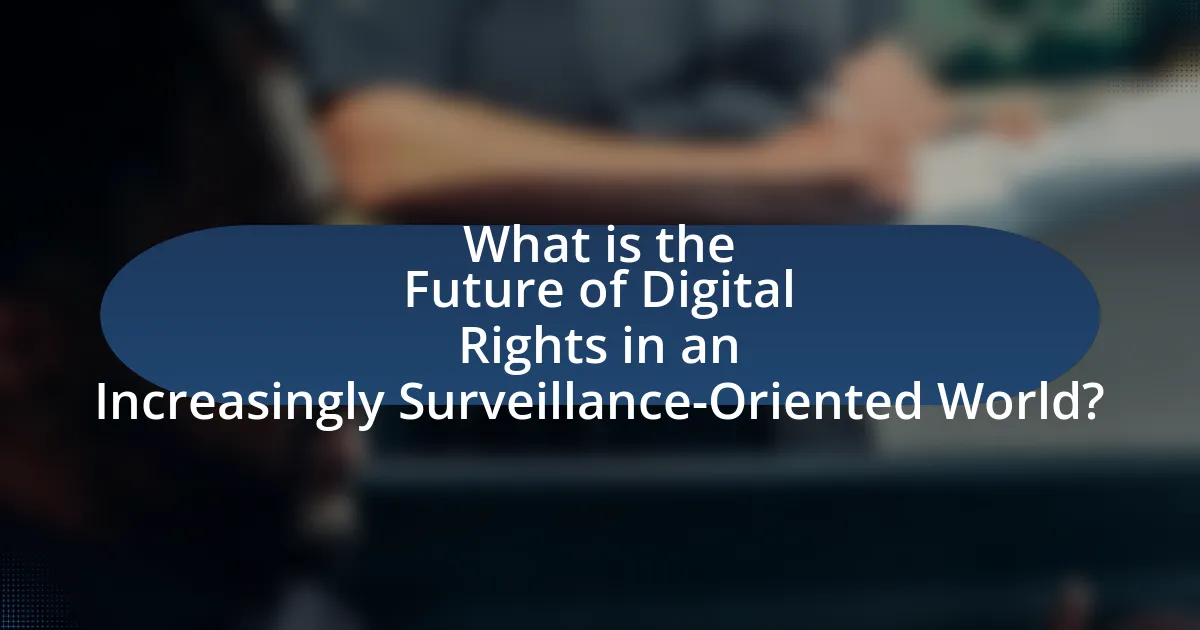
What is the Future of Digital Rights in an Increasingly Surveillance-Oriented World?
The future of digital rights in an increasingly surveillance-oriented world is likely to involve heightened advocacy for privacy protections and regulatory frameworks. As governments and corporations expand surveillance capabilities, individuals and organizations are expected to push for stronger legal safeguards, such as the General Data Protection Regulation (GDPR) in Europe, which sets a precedent for data privacy rights. Additionally, public awareness of surveillance practices is growing, leading to increased demand for transparency and accountability from both state and private entities. This shift is evidenced by rising support for digital rights movements and initiatives aimed at protecting personal data, such as the Electronic Frontier Foundation’s campaigns. Ultimately, the trajectory of digital rights will depend on the balance between technological advancements and societal values prioritizing individual privacy.
How can individuals advocate for their digital rights?
Individuals can advocate for their digital rights by actively participating in policy discussions, supporting organizations that promote digital privacy, and educating themselves and others about their rights. Engaging in public consultations and providing feedback on legislation related to digital rights can influence policymakers. Supporting organizations like the Electronic Frontier Foundation or the American Civil Liberties Union, which work to protect digital rights, can amplify individual efforts. Furthermore, educating oneself about data protection laws, such as the General Data Protection Regulation (GDPR), empowers individuals to assert their rights effectively.
What strategies can be employed to raise awareness about digital rights?
To raise awareness about digital rights, organizations can implement educational campaigns that focus on the importance of privacy, data protection, and user consent. These campaigns can utilize social media platforms, workshops, and community events to disseminate information effectively. For instance, the Electronic Frontier Foundation has successfully raised awareness through its “Digital Privacy” initiatives, which educate the public on their rights and the implications of surveillance. Additionally, partnerships with tech companies to promote transparency in data usage can further enhance public understanding of digital rights.
How can technology be leveraged to enhance privacy protections?
Technology can be leveraged to enhance privacy protections through the implementation of encryption, anonymization techniques, and decentralized data storage. Encryption secures data by converting it into a coded format that can only be accessed by authorized users, thereby protecting sensitive information from unauthorized access. For instance, end-to-end encryption in messaging apps ensures that only the communicating users can read the messages, preventing interception by third parties. Anonymization techniques, such as data masking and pseudonymization, remove personally identifiable information from datasets, allowing organizations to analyze data without compromising individual privacy. Additionally, decentralized data storage solutions, like blockchain technology, distribute data across multiple nodes, reducing the risk of centralized data breaches and enhancing user control over personal information. These technological advancements collectively contribute to stronger privacy protections in an increasingly surveillance-driven digital landscape.
What role do organizations and governments play in shaping the future of digital rights?
Organizations and governments play a crucial role in shaping the future of digital rights by establishing regulations, policies, and frameworks that protect individuals’ online privacy and data security. Governments enact laws such as the General Data Protection Regulation (GDPR) in the European Union, which sets stringent guidelines for data handling and user consent, thereby influencing global standards for digital rights. Organizations, including non-profits and advocacy groups, work to raise awareness, lobby for stronger protections, and hold entities accountable for violations, as seen with groups like the Electronic Frontier Foundation (EFF) that advocate for civil liberties in the digital space. Together, these entities create a landscape where digital rights are continuously negotiated and redefined in response to technological advancements and societal needs.
How can international cooperation improve digital rights protections?
International cooperation can improve digital rights protections by establishing unified legal frameworks and standards that govern data privacy and user rights across borders. Such collaboration enables countries to share best practices, harmonize regulations, and create binding agreements that protect individuals from surveillance and data exploitation. For instance, the General Data Protection Regulation (GDPR) in the European Union has set a precedent for data protection laws globally, influencing countries to adopt similar measures. Additionally, international coalitions, such as the Global Privacy Assembly, facilitate dialogue among nations to address emerging digital threats and promote accountability among tech companies. This collective approach enhances enforcement mechanisms and ensures that digital rights are upheld universally, reducing the risk of exploitation in a globalized digital landscape.
What initiatives are currently being proposed to safeguard digital rights?
Current initiatives proposed to safeguard digital rights include the implementation of comprehensive data protection regulations, such as the General Data Protection Regulation (GDPR) in Europe, which sets strict guidelines for data collection and user consent. Additionally, various organizations advocate for the establishment of digital rights frameworks that emphasize user privacy, transparency, and accountability in technology. For instance, the Electronic Frontier Foundation (EFF) promotes policies that protect individuals from invasive surveillance practices and ensure equitable access to digital resources. These initiatives are supported by growing public awareness and demand for stronger protections against data exploitation in the context of surveillance capitalism.
What practical steps can individuals take to protect their digital rights?
Individuals can protect their digital rights by implementing strong privacy settings on their devices and online accounts. This includes using two-factor authentication, regularly updating passwords, and reviewing privacy policies of services they use. According to a 2021 report by the Electronic Frontier Foundation, individuals who utilize these measures significantly reduce their risk of data breaches and unauthorized access. Additionally, employing encryption tools for communications and data storage further safeguards personal information from surveillance and exploitation.
